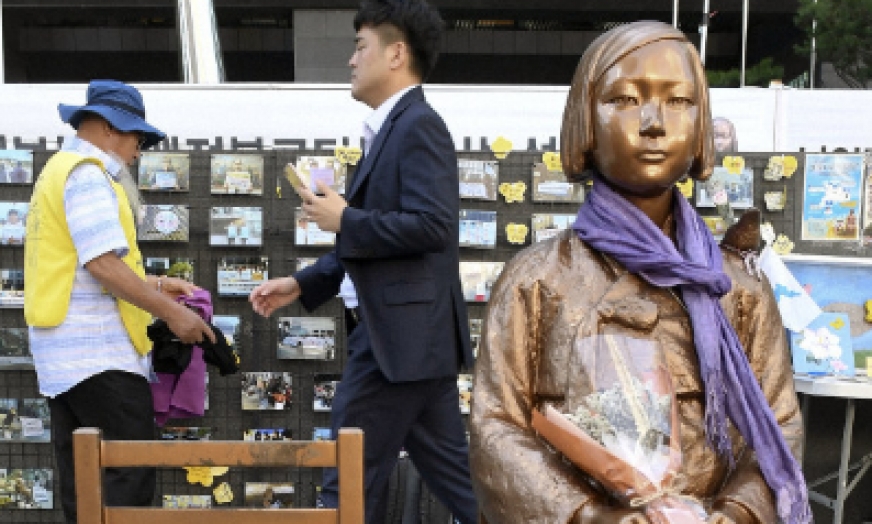 This Aug. 14, 2019 photo shows a statue symbolizing "comfort women" in front of the Japanese Embassy in Seoul. (Kyodo)
This Aug. 14, 2019 photo shows a statue symbolizing "comfort women" in front of the Japanese Embassy in Seoul. (Kyodo)
S. Korea commemorates 'comfort women' memorial day
SEOUL (Kyodo) -- South Korea on Wednesday observed the country's official "comfort women" memorial day for the second year, with a ceremony held to memorialize Korean women who were forced to work in wartime brothels for the Japanese military.The country marked the day as its ties with Japan hit their lowest point in years over disputes that stemmed mainly from compensation orders by its top court against Japanese companies over wartime labor.
The South Korean government in 2017 designated Aug. 14 as the Japanese Military Comfort Women Victims Memorial Day, as on the same day in 1991 Kim Hak Soon, a former comfort woman, became the first among surviving victims to give testimony about the hardships the women faced.
The government has used the day to communicate to the international community that the issue of comfort women is also a matter of sexual violence against women during wartime and of women's universal human rights.
This year's ceremony in Seoul was attended by Gender Equality and Family Minister Jin Sun Mee, among other government officials. President Moon Jae In, who attended last year's first official comfort women memorial day, would not be attending, his office said just before the event.
The Seoul municipal government is set to unveil a statue symbolizing the women at a park in Namsan later in the day.
A weekly rally to demand a sincere apology from Japan to former comfort women will also be held near the Japanese Embassy in Seoul. The rally would be the 1,400th such protest.
The comfort women issue has for years been a source of tension between South Korea and Japan, which ruled the Korean Peninsula from 1910 until it was defeated in World War II in 1945.
The two countries in 2015 agreed to "finally and irreversibly" settle the protracted bilateral row, with Japan issuing an apology to former comfort women for their sufferings and providing 1 billion yen ($9.5 million) to a foundation meant to help the victims financially.
But the Moon administration, formed after the agreement, said the deal could not settle the issue as it did not reflect the opinions of the surviving victims.
It took procedural steps last month to formally dissolve the foundation, drawing harsh criticism from Tokyo as it was done without Japan's consent.
South Korea will be celebrating Liberation Day on Thursday, commemorating the end of Japanese colonial rule that came with Japan's surrender to the Allied forces on Aug. 15, 1945.
Source: https://mainichi.jp/english/articles/20190814/p2g/00m/0in/047000c
 English
English Japan
Japan

drug research and development process abreva samples for healthcare providers how can men increase libido cheap viagra rate male enhancement pills cialis peak effectiveness time lantus solostar
ivermectin for acne ivermectin 0.1 uk horse health equine ivermectin paste 1.87 what is the difference between dimmitrol and ivermectin for dogs
where to buy ed pills online - ed remedies buy erectile dysfunction drugs over the counter
neurontin cost gabapentin 1000mg neurontin 600 mg ne ilac?± where can i buy gabapentin
northwest canadian pharmacy - walmart online pharmacy canadian mail order pharmacy
sildenafil in women viagra triangle chicago ed supplements that work in minutes benefits of watermelon for women viagra trial card loss libido in women viagra history sildenafil 100mg cost viagra patent expiration 2017 viagra meaning best time to take viagra 800 number for viagra buy zytenz at walgreens viagra en ligne large pink capsule alcohol and lipitor side effects instant natural viagra viagra manufacturer generic viagra dose viagra and cialis mix tadalafil 5 mg price buying viagra can i get free birth control pills male enhancement pills walmart grapefruit benefits and risks best impotence pill viagra otc cialis 30 day trial coupon cocaine interactions with other drugs how well does sildenafil work kroger store open 24 hours compra viagra generic drugs online
azithromycin drug class where to get zithromax over the counter azithromycin 500 mg and alcohol how long does it take for chlamydia to go away after taking azithromycin
plaquenil in covid retinal half life of plaquenil how long for plaquenil to start working
priligy depoxetina dapoxetine buy online in india priligy what is it?
25 mg tadalafil - discount canadian cialis cheap viagra tablet
amoxicillin prescription buy amoxicillin online biy amoxil without prescription in orlando amoxil 500 mg walgreens price
prednisone empty stomach can you buy prednisone online uk can you take benadryl with prednisone how to get rid of prednisone moon face
prednisone euphoria does prednisone keep you awake what is considered a low dose of prednisone
prednisone blurry vision prednisone 5092 can you drink wine with prednisone how long does it take for prednisone to work for rheumatoid arthritis
ivermectin for sale online - ivermectin cost australia stromectol 3 mg tablet price
avanafil plus dapoxetine super avana tablets where can you buy dapoxetine not online how to take dapoxetine for pe
fda approved drug database is grapefruit seed extract safe cost of generic sildenafil viagra use sildenafil humalog copay card best price for cialis 5mg
provigil half life modafinil for sale can modafinil be cut in half what is the average dose for provigil
amoxil contraindications amoxicillin 500 mg price why is my face red after amoxil how does amoxil treat bacterial infections
rivers casino - play casino slots slot machines
best male enhancement products at gnc lyrica coupons for medicare patients female viagra fda levitra enhancement products generic viagra vs real best supplement company ratings
zithromax for toddler azithromycin 280 mg what is zithromax 250 mg used for what are the serious side effects of azithromycin?
where to buy amoxicillin - amoxil 250 where to buy amoxicilin 500 mg
humalog copay assistance goldmax locations viagra online kaufen uses for grapefruit rind female viagra pills reviews kroger generic drug list